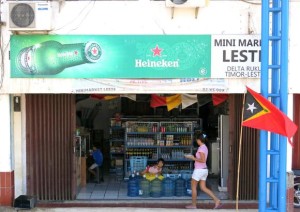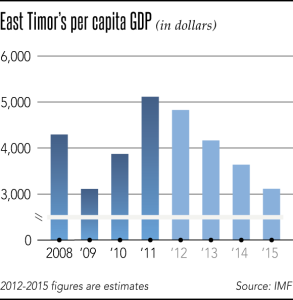Dutch beer giant Heineken is set to become the first world-renowned manufacturer to set up a production base in East Timor, a small Southeast Asian nation formally known as Timor-Leste.
Heineken’s move comes at a time when East Timor, the first country to gain independence in the 21st century, is becoming increasingly thirsty for foreign investment to achieve self-sustaining economic growth.
Heineken will start producing the first local brand beer and other beverages in the country at the end of 2016.
Demand for beverages is expected to grow in East Timor as the country has a very young population as well as a subtropical climate. Roughly half the country’s population is 15 years old or younger.
The government has taken various drastic measures to improve its investment climate. The country now has the potential to become a hub for exports to its populous northern neighbor, Indonesia, and also to its wealthy southern neighbor, Australia.
Dili plant
Heineken will this month begin piling work for building a beverage plant in the Hera district near the capital, Dili. The $40 million plant will produce beer and soft drinks. Prefabricated structures are being built and assembled in China and are scheduled to arrive on the site by April 2016.
A mall in Dili is crowded with young shoppers.
Heineken has more than 160 plants around the world. The new plant in East Timor will be much smaller than the company’s average plants, producing 30 million liters of beverages, including soft drinks, annually.
The Dutch brewer is also considering growing barley, one of main ingredients in beer, locally to enhance the plant’s profitability. The company’s investment will create new jobs and help promote the local economy.
Vinay Mathur, general manager of Heineken Timor, Heineken’s local subsidiary, said that East Timor has so far been just an export destination but the country will now become a place for production and distribution.
Mathur is now thinking about a growth strategy in East Timor, where, he said, Heineken-affiliated brands already have a dominant market share of 80%.
The plant will produce a new brand of beer as well as three Heineken-affiliated brands — Tiger, Bintang and ABC.
Foreign focus
East Timor gained independence from Indonesian occupation in 2002, about a quarter century after being annexed by its bigger northern neighbor.
East Timor’s government shifted its policy focus from maintaining security to attracting foreign investment in a bid to achieve self-sustaining economic growth, following the withdrawal of United Nations peacekeeping troops at the end of 2012.
In 2014, East Timor established the Specialized Investment Agency as a one-stop service provider to help foreign companies get approval for investment projects.
The government has also taken various other measures to attract foreign companies, including levying a low corporate tax rate of 10% on them and allowing them to set up wholly owned subsidiaries in all industries, taking advantage of the abundant and relatively young labor force. The minimum wage is also low, at $115 per month.
Distinct advantages
There are several reasons Heineken decided to invest in East Timor amid growing political stability and improvements in the investment climate there.
One reason is the country’s approximately 1.2 million population, which is small but young and continuing to grow.
According to the International Monetary Fund, East Timor’s population is expected to grow by 16% to 1.47 million in 2020 from an estimated 1.27 million now.
With 99% of the population being Christian, there are also almost no religious restrictions on the consumption of alcohol in the country. Heineken Timor’s Mathur said that 40,000 people will reach the drinking age every year in the medium term. Annual per capita alcohol consumption in East Timor is five to six liters, less than half the comparable figure for Papua New Guinea, a neighboring developing country. But demand for alcoholic beverages is expected to grow in tandem with economic development.
Another reason for Heineken’s decision to invest in East Timor is the fact that there is no competing local brand beer.
Even after its 2002 independence, East Timor has continued to rely completely on imported beer. Once Heineken’s operations in the country get on track, the company will be able to further solidify its dominant position in the local market.
By investing in East Timor, Heineken will also be able to get a head start over rivals in forging closer relations with the local government, which wants to develop domestic industries as soon as possible.
Seeking diversity
Revenue from oil and gas in the Joint Petroleum Development Area between East Timor and Australia is the main source of East Timor’s government revenue. The country has no other major industry, except agriculture, which includes coffee.
Per capita gross domestic product is between $3,000 and $4,000, much larger than in Vietnam or the Philippines.
But the standard of living is low, as the oil and gas revenue flows directly into the state coffers through the petroleum fund. Slumping global oil prices have also hit the country’s finances recently.
East Timor faces the urgent task of reducing its heavy dependence on oil and gas and developing various other industries to create jobs for its growing population.
The government has just started focusing on trade and investment institution building. Heineken Timor’s Mathur said that the company wants to seek preferential treatment in terms of commodity tax and import tariffs.
Hurdles remain
Foreign manufacturers are still cautious about making large-scale investments in East Timor because of many hurdles, including the country’s poor ports, inadequate customs clearance system, and insufficient laws related to land expropriation and finance.
Under these circumstances, some foreign beverage makers are now stepping up efforts to strengthen their sales and distribution channels there first.
For example, Thai Beverage, a major Thai brewer known for its signature Chang beer, set up a wholly owned subsidiary in East Timor through a group company to expand sales there.
The country is now seeking to join the 10-nation Association of Southeast Asian Nations. Thai Beverage will also explore the possibility of producing beverage products there and shipping them to Indonesia.
Japan’s Otsuka Holdings also formally started selling Pocari Sweat, a sports drink popular in Indonesia, in East Timor in July through a local sales agent. Otsuka Holdings will try to create new demand for the beverage product by dispatching its sales training staff.
New shopping malls and hotels have opened in Dili one after another in recent years amid growing demand for food and drink sold through a modern distribution network.
Burger King entered the market in 2013. The U.S.-based fast-food chain and other Western-style restaurant chains have opened more new outlets in the country.
It takes just under two hours to travel from the Indonesian island of Bali and Singapore to Dili on direct flights. The central commercial district of the East Timorese capital is an approximately 10-minute drive from the airport.
If the investment climate improves further, the country may become a strategic hub for exports to Indonesia and Australia because of its favorable geographical location.
The government is also planning to develop a special economic zone.
Citing East Timor’s rich natural environment, such as the beautiful ocean and mountains, Tony Duarte, president of the Specialized Investment Agency of Timor-Leste, disclosed that some resort developers in Southeast Asia have decided to invest in the country.
Duarte also expressed hope that these moves by resort developers will help encourage more foreign manufacturers to set up operations in East Timor and also attract more foreign nationals making business trips to the country.



